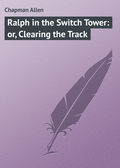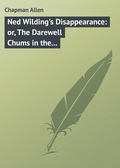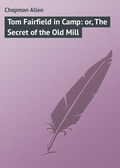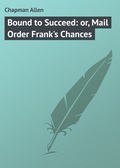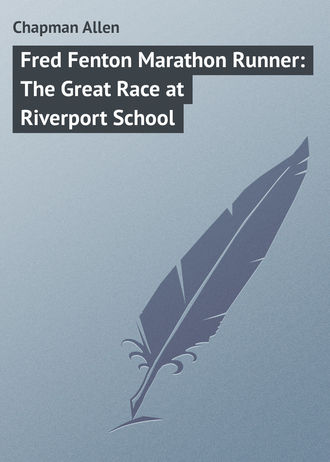
Chapman Allen
Fred Fenton Marathon Runner: The Great Race at Riverport School
CHAPTER XVI
TELLING BRISTLES
"Hello there, Fred, and you too, Colon; glad to see you both! Step in, and come upstairs with me to my den, won't you?"
In this fashion did Bristles meet the two visitors at the front door, and convinced by the warmth of the reception that they were going to be welcome guests, Fred and the tall boy fell in behind the one who had admitted them. Presently they found themselves comfortably seated in such chairs as decorated the so-called "den," which was a small room on the top story, where Bristles kept his belongings and did his studying.
"Glad to see your bad cold is a lot better, Bristles!" remarked Colon, with a sly wink over toward Fred, who chuckled.
Bristles of course looked puzzled.
"I suppose that's, some sort of a poor joke," he ventured, cautiously, glancing from one to the other of his visitors; "but me, I'm groping all around in the dark, and don't seem to catch on. S'pose you open up, and explain how it works, Colon."
The tall boy allowed his eyebrows to go up as though tremendously surprised.
"Do you mean to tell me, Bristles Carpenter, that you didn't call up Fred, here, a little while back, and while begging him to hurry over, as you had something important to explain, say you'd taken such a cold you could hardly speak plain?"
"What, me? Say, you're dreaming, Colon. I never said a word of that, and right now I haven't got the least bit of a cold!" exclaimed the other, indignantly. At the same time he began to show a certain amount of curiosity, for his good sense warned him there must be a story back of Colon's strange accusation.
"And you didn't interrupt yourself several times to say, 'Oh! excuse me, while I cough!' and then start in whooping it up so hard Fred here had to take the receiver down from his ear or go deaf?"
"Oh! Come off, and tell me what all this silly stuff means!" demanded the still more mystified boy. "Has anybody been playing a rousing good joke on Fred, and making out to be me?"
"That's about the size of it, isn't it, Fred," Colon assented, eagerly enough. "It was a rousing enough joke, while it lasted, but the trouble is that it turned out to be one of those back-action, kicking jokes, that turns on the jokers, unexpected like. This one left a black eye, and a whole lot of black and blue marks behind it – that is, we believe so, and have a pretty good reason, too."
"All right, now tell me what it all means, please," Bristles pleaded, seeing that the tall chum was really in earnest.
Colon explained, and as he finished, the astonished listener demanded:
"But what d'ye reckon it all means?"
"Both of us noticed that their main plan seemed to be to kick at our shins every chance they got," explained Fred, "and Colon says they had heavy brogans on, too. It's a hard thing to say, Bristles, but we honestly believe they meant to lame us, so we couldn't be in shape to run to-morrow, and perhaps at the time of the great Marathon, too."
Bristles clenched his hands, and looked savage.
"Well, what d'ye think of that now for a savage trick?" he exclaimed. "I wouldn't believe it of those Mechanicsburg athletes, who've always seemed a pretty decent bunch of fellows."
"Hold on," said Fred. "Go a little slow, Bristles."
"What for?" demanded the other, impetuously and fiercely.
"Because you're making the same mistake Colon here did at first," he was told.
"About the boys up the river, you mean, Fred?"
"Yes. It isn't fair to accuse them without any proof," the other told him.
"But the Paulding crowd – " stammered Bristles, evidently taken aback.
"Get closer home," warned Colon. "What d'ye want to go climbing all over the country for, when you've only got to use your nose to smell a rat right in old Riverport!"
"Jupiter Pluvius! you must mean our old friend, Buck!" ejaculated Bristles, his elevated eyebrows indicating his astonishment. "Tell me about that, will you? Has he actually come to life again, and been up to his old tricks?"
"We're dead sure of it," Colon told him, nodding his head at a lively rate.
"Then chances are you recognized one of the bunch?" suggested Bristles.
"No," said Fred, "we couldn't do that very well, because they changed their voices, and had their faces hidden by their hats, coat collars, and even some sort of cloth that seemed to be tied about their jaws. But after the scrap was over, we picked up a clue that we think will give the game away."
"What, Fred?"
"Take a look at this old hat, Bristles," continued the other, as he drew the article in question from his pocket.
"Well, I'm looking at it," he was told.
"Ever see it before?" asked Colon, eagerly.
"Of course I wouldn't like to raise my hand, and swear to it," remarked Bristles, slowly, "but I want to say this looks mighty like a yellow-colored hat I've seen a certain fellow wear, time and again."
"Suppose you go a little further, then, and mention his name," proposed
Fred.
"Conrad Jimmerson!" promptly replied the other.
Colon laughed gleefully.
"Now turn the hat around, Bristles," he cried, "and look inside!"
Upon doing so the other uttered an exclamation.
"Here they are, two letters that give the thing away – C.J. as plain as print could be!" was his cry.
"Glad that you think the same way we do," Colon told him. "And now, I reckon you wonder what Fred's going to do about it."
"If it were myself, I'd take this hat to Cooney, and ask him if it was his," Bristles went on to say, in his fiery fashion. "Course he'd have to acknowledge the corn, and then I'd proceed to give him the licking he deserves."
"We'd kind of expect that of you, Bristles," remarked Colon, magnanimously, "but you see, Fred'n me, we made up our minds that we'd given that bunch a pretty good layout as it was. What they need is something to show the people of this town what a tough lot that Buck Lemington is dragging around with him."
"But how could you do that?" the other asked.
"Fred thought of taking the hat to school, and telling the story around, to the teachers and the pupils," Colon explained, in his accommodating way. "When they learned how these toughs meant to injure Riverport's chances of winning the great Marathon, just to gratify a little private spite, the town would soon get too hot for Buck and his cronies. They'd have to emigrate for a little while, till the storm blew over."
"That sounds good to me!" declared Bristles, changing his way of thinking, for while a very determined boy, he could always be reached by argument, and was open to conviction, "and I hope you carry the plan out, Fred. I'd just like to see those boys put under the ban for a while. Some of them by rights ought to be in the State Reformatory, according to my notion. They're getting too fresh with what they call their pranks, and don't even stop at endangering human life."
"Well, of course we're glad that you haven't such a terrible cold, Bristles," remarked Fred, "but all the same Colon here is sorry for one thing."
"What might that be?" asked the said Colon.
"You see," continued Fred, "after I told him about how you called me up, and wanted an interview right away, because you had something important to tell, Colon here began to get terribly excited. He kept wondering what it was you meant to explain; and I know that after we'd run that mob off, nearly the first thing he said was that he felt cheated out of a sensation, because you didn't want me so bad after all."
At that Bristles laughed loud and long, at the same time looking queerly at his guests out of the tail of his eye.
"Too bad to disappoint you, isn't it, fellows?" he went on, in a tone of mock sympathy, "but say, maybe I might scare up some little news after all, that'd kind of take the place of the thrilling story they hatched up for me."
"Let it be on the strict level then, Bristles," warned Colon, severely, as he shook his forefinger at the other; "we don't want you to invent any old yarn just to please us."
"What I'm going to tell you," began Bristles, very solemnly, "is straight goods, believe me. I don't know whether Fred here will think it of much importance, but late this afternoon I chanced to run across an old acquaintance. Guess who it was, boys."
"Huh! I bet you it was Corny Ludson!" exclaimed Colon, quick as a flash.
Bristles started, and looked keenly at the long-legged chum.
"Well, you hit mighty close to the bull's-eye, then, Colon," he remarked; "but you forget I never saw that same Corny Ludson in my life that I know of, and so how could he be an old acquaintance. But he's got a little girl named Sadie, a niece, or ward, or something like that, you may remember."
"Then you saw her?" asked Fred, eagerly enough, for he had been wondering lately what could have become of those two children.
"Not only saw her," continued the other, "but talked with her."
"Tell us about it, Bristles," urged Colon.
"Why, it was this way," began the other, complying briskly. "She was just coming out of the cheap grocery, and had several bundles in her arms, as if she might have been buying bread, and some such things. I knew her just as soon as I set eyes on her, for she wore that same old frowsy red dress, and had a little tad of a shawl pinned over her shoulders. The poor thing looked like a wind'd blow her away, with her thin, pinched face, and big startled eyes."
"Oh! let all that drop, Bristles," expostulated Colon. "What we want to know is, how did you come to speak to her, and did she remember you?"
Bristles was bound to tell his story in his own way. Without paying any attention to this nagging on the part of the tall chum, he kept facing Fred, and went on deliberately.
"There was a horse and buggy standing at the curb, and say, you never in all your life saw such a dilapidated outfit. Talk to me about the famous 'one hoss shay,' it couldn't have been a circumstance beside that rig. Everywhere the shafts were tied up to hold, the harness patched till it looked all strings, and the animal, well, he was a walking skeleton. Any other time I'd have laughed myself sick, but I couldn't do that then, with that poor little thing being the one that drove such an outfit."
"What did you say to her?" asked Fred.
"Oh! I said 'howdy-do, Sadie, don't you remember me?' and she looked scared at first, and then she actually smiled. She said she hadn't forgotten the two boys on the river, who had been so kind to Sam and her. I asked her where she'd been all this time, and she looked kind of confused and said, 'Oh! around everywhere!' as if they might be a pack of regular Gypsies, and never knew what it was to have a home of their own."
"But you say she had some sort of a rig with her," expostulated Colon at this point of the narrative, "and wouldn't that look as if they'd squatted down somewhere or other, for a spell?"
"Maybe it would," replied Bristles, "but the chances are they only borrowed the outfit for the occasion from some poor farmer, paying for its use by fetching him home some supplies from town. But just then I remembered about that pin we found in the cave, and I took it out of my pocket, unwrapping the paper, and all of a sudden holding it before her."
"Did she recognize the breast pin?" Colon asked.
"You'd have thought so by the way her little face lighted up," said the other, "and reaching out the hand that didn't carry a package, she took bold of it. Then I made a fool move, just like my silly ways. I sprung the trap too soon!"
"You told her where you'd found it, said you thought it might be hers, just because you remembered her wearing something like that, didn't you?" asked Fred.
"Sure I did, and you just ought to have seen the scared look that came over her face," Bristles admitted. "She looked all around as if she was afraid that Corny'd be popping up, and then shook her head again and again, saying the pin wasn't hers. But, Fred, I know the poor little girl was telling a fib, because she was afraid if she owned up to the old piece of fake jewelry that she seemed to value so much, it might get somebody in a peck of trouble; and we know who that is, don't we?"
"We certainly do!" replied Fred; and he started to tell Bristles how Colon learned Corny Ludson had also been in Riverport that afternoon, acting in a suspicious manner.
CHAPTER XVII
LINING UP FOR THE TRIAL SPIN
The next morning opened cloudy, and rather warm for the season, much to the regret of all those fellows who had planned to take a spin over the twenty-five mile course laid out by the committee of arrangements.
So long as it did not rain, they were not to be kept from carrying out their ambitious plans. About eight o'clock Bristles and Colon, standing in front of the picket fence that divided the Carpenter garden from the road, saw Fred coming up the street.
"There's Fred," announced Colon, "and I hope Sid shows up soon, because we'd better be making an early start."
The way in which he looked up at the sky when saying this caused Bristles to instantly remark:
"Now, I reckon you're thinking it's going to rain on us before we get back home again. That left leg of yours that you got hurt once, is a regular old barometer, it seems, Colon."
"I don't know just how it comes," admitted the other, "but nearly every time it gets to itching and burning, we do have a spell of bad weather. Over at my house when they see me rubbing that leg, they begin to hunt up rubbers and raincoats to beat the band. It's gotten to be next door to infallible, dad says."
"All right, we'll forgive you if you do bring a dash of rain to-day," warned the other, "but be mighty careful how you let that leg get to itching toward the end of next week. Why, a rain'd play the dickens with all our plans for that glorious long run."
"You don't smash a thermometer every time it tells you how hot or cold it is, do you?" demanded Colon. "Then why d'ye want to blame things on my leg barometer? Just as if it had anything to do with the weather, 'cept to warn you ahead. Seems to me I ought to have a gold medal, instead of abuse. But here's Fred, and looking as if he was in apple pie trim for making the grand rounds to-day."
Of course all of them were in their running outfits, which consisted of trunks, sleeveless jerseys, shoes with spikes in the soles, and an excuse of a hat, though Bristles declined to wear anything on his mop of hair.
"All here but Sid, now, Fred," announced Colon, as the other joined them.
"We're a little ahead of the time that was set," remarked Fred, who seemed to be unusually sober it appeared to the sharp-eyed Colon, "and Sid will be along soon. I saw him heading for town, and he called across lots that he had a little errand, but would join us as soon as he could get back home, and pile into his running togs. Let's sit down somewhere, and take it easy, boys."
"A good idea, too," commented Bristles, "because, with a twenty-five mile run before us, we'll have all the standing on our feet we want. Chances are it'll be a pretty tired bunch of boys that'll turn up here some hours from now."
They found a place to settle down, and after a little talk about the weather, during which Colon was called upon to once more prophesy as to the chances for rain, he suddenly turned to Fred, to say:
"What's bothering you this morning, Fred?"
"Why do you ask me that?" returned the other, with a little smile.
"Well," Colon continued, "I'm used to watching faces, and it struck me when you came up, there was a worried look on your face. Hope you're not feeling anyway off?"
"Never felt in better condition in my life," Fred assured him. "One or two little bruises from that business of last night, but nothing to mention, and I don't expect to even think of them again."
"What happened, then?" asked Bristles.
"Only that our house was entered last night!" Fred observed, calmly.
The other boys gave expression to their astonishment in various exclamations.
"Burglarized, you mean, Fred?" cried Colon.
"Well, yes, I guess you might call it that, though it seems only one particular thing was carried off," Fred replied.
"You've got us guessing good and hard," said Bristles. "Was that your dad's pocketbook, his watch, the piano, or what could it be?"
"A hat," explained Fred.
Bristles and Colon fairly gasped upon hearing this.
"D'ye mean to tell us, Fred, that a desperate burglar would take all the chances of breaking into a house where he might get shot, just to steal a hat!" Colon demanded, as though suspecting they were being made the victims of a joke, although as a rule Fred seldom allowed himself to attempt anything of the kind.
"Sometimes even a hat may be a mighty important thing, if you stop to think of it, fellows," he informed them.
"Great smoke! Fred, do you mean that hat?" exclaimed Bristles, suddenly remembering something.
"The one we picked up on the battlefield!" added Colon, helplessly.
"That's the one I mean," they were told by the other, with a positive tone that could not be mistaken. "When I got home I tossed it onto the hall table. It wasn't there this morning, and I asked the girl, and everyone about the house if they'd seen it, but nobody had. And what was plain evidence of a robbery was the fact that a window was found open in the sitting-room, which my dad says he is sure he shut and locked before he went to bed."
"It was Cooney Jimmerson, of course?" suggested Colon.
"He's always been too clever with his fingers," Bristles gave as his opinion. "Maybe you remember, Colon, because it was before Fred's time here, how Cooney used to sneak into the coat-rooms at school, and go through the pockets of our reefers looking for pennies or tops or any old thing. He got in a peck of trouble on account of his sly tricks. If anybody could turn the catch of a window, and crawl in, I'd put it up to him."
"But Fred, how would he know you'd found his old hat?" asked Colon.
"We'll have to guess at that," he was told. "Look back, Colon, and you'll be likely to remember that several times we heard a rustling sound in that clump of bushes, while we were standing there talking, after finding the hat."
"Yes, and you thought it might be only a rabbit, or a chipmunk, or something like that," assented Colon, promptly.
"Now that the hat we were keeping as evidence has been stolen from my house," Fred continued, "I'm more than sure that must have been Cooney himself. He'd missed his hat, and afraid that we might find it, he came creeping back to get into that bunch of brush, where he could hear every word we spoke. So he knew I was keeping his hat to prove who was in the crowd that tackled us unawares."
"He just knew that if his hat were ever shown, he'd be in the soup," observed Colon, "so he thought it worth while to take all kinds of chances in the hope of copping it again. But let me tell you, the boy who'd open a window, and creep into a neighbor's house night times, is pretty close to the line. He's on the road to being a regular professional thief when he grows up, because it shows he likes that sort of thing."
"You know they say, 'as the twig's inclined, the tree is bent,'" Bristles told them, ponderously, "and we all can guess what'll become of Buck Lemington some day. He'll either make a striking figure in finance, or else head some big swindle that'll send him up for twenty years."
"But with the evidence gone," Colon remarked, "of course that ends the plan to show Cooney up at school?"
"Yes, and that was what he took such big chances for," Fred admitted. "We might tell the whole story, but without any positive evidence there would always seem to be a weak link in it. Some folks might even say we were prejudiced. They'd rather believe the attack came from one of the other towns. People always like to believe bad things about rival places rather than the home town. So we'd better shut down on that hat part of the story, and keep it quiet."
"Course it doesn't matter if we let it be known we were set upon, only we mustn't say we suspect any particular boys," Colon went on to remark, with a little confusion that told Fred he must have already been telling something about the encounter, though not mentioning names.
"Call that settled, then," Bristles added, "but it's too bad, when you had the case framed up against Cooney for fair and keeps. He'd have found himself the most unpopular fellow in Riverport, that's, right."
"The main thing with me," Fred explained, "was the hope that when everybody got to pointing the finger of scorn at Cooney, he'd feel so mean and small that, not wanting to stand for all the abuse alone, he'd up and confess that it was Buck who had started the racket. But as our plans have missed fire, we'll have to forget all about it. We've got our hands full as it is with this race, and getting ready to do our level best to win."
"I think I see Sid coming," Colon told them just then, and as he had an advantage over the rest by reason of his long neck, nobody disputed his word.
"We haven't forgotten anything, I hope?" Bristles observed, as they arose to their feet, and began to stretch themselves, boy fashion.
Fred carried a little pouch at his side that he did not believe would interfere at all with his running, though of course even this would be discarded when the great Marathon test was on. In this he carried matches, a small but reliable compass, and a few simple remedies that might come in handy in case any of them happened to be seized with colic or cramps from drinking water when overheated.
"Nothing that I know of, Bristles," Fred announced, as he touched this small pouch which, in the woods among old hunters would probably be called a "ditty-bag," and contain all manner of little odds and ends likely to be needed from time to time.
Sid was now running. The mere fact that he might be a little behind time would hardly seem to be sufficient excuse for his starting off in this way. Fred eyed the newcomer as he approached them. He fancied that Sid was bringing news of some kind.
Sid was breathing a little fast. That was to be expected in the start, though when he got his "second wind" he would very likely be good for a long, hard run.
"Give me five minutes, fellows, to rest up in, so we can all start even,"
Sid went on to say, "and besides, I've got something to tell you."
All of them dropped down again on the fresh green grass that the recent warm weather had caused to sprout forth luxuriantly in places.
"We're listening," Bristles told him, placing the cup of a hand back of his ear, as though he wanted to make sure of not losing a single word, while Colon assumed an eager attitude, with his eyes glued on Sid's flushed face.
"None of you happened to go down-town this morning, I reckon?" was the first thing Sid said, and as three heads were vehemently shaken in the negative, he continued, "Well, then it'll give you something of a surprise to know that it's happened again."
"Not a fire in the high school?" exclaimed Colon, for a serious event of this kind had taken place in the near past, that had created something of a panic in Riverport.
Sid shook his head in the negative.
"This was a robbery," he went on to say, in a way that gave the other three a severe shock; "just as when old Periwinkle was robbed. This time it was Mrs. Merriweather, the rich widow, who owns so many houses, and gets her rents in on the first. Somebody broke in there, and she never knew till this morning that her desk had been pried open, and three hundred dollars taken!"



